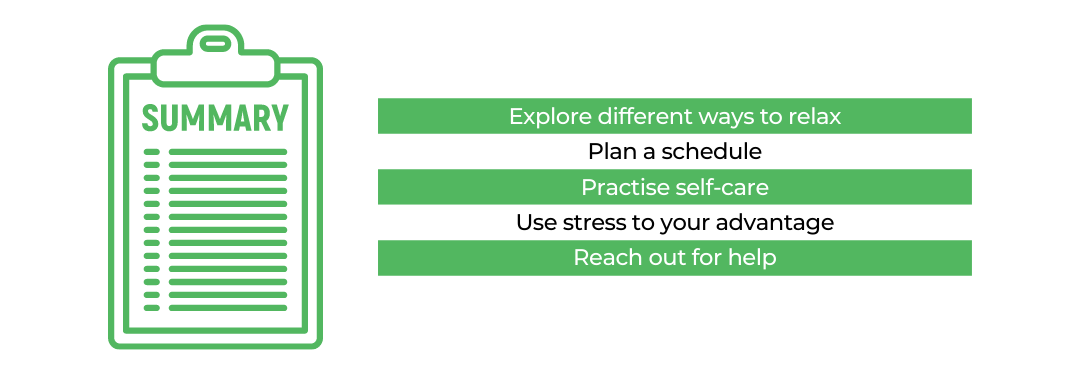If you’re going through the HSC, you might feel immense pressure from your parents, teachers or even yourself, to do well. Dealing with exam anxiety isn’t easy, but we want to give you some guidance on stress and anxiety relief, as you ride the rollercoaster that is the HSC.
The number one thing that you must remember is that you are not alone and your feelings are valid!
To help you out, we spoke with a professional high school psychologist who gave us a unique insight into the practical ways students can help ease their exam anxiety.
So, let’s get started!
Tip #1: Explore Different Ways to Relax
Tip #2: Plan a Schedule
Tip #3: Practise Self-care
Tip #4: Use Stress to Your Advantage when Experiencing Exam Anxiety
Tip #5: Reach Out for Help
Meet Tommasina Owens
Tommasina Owens is a High School Psychologist and has had many years of experience helping students guide their way through exam stress and anxiety.
Below are five tips you may consider incorporating to mitigate HSC exam anxiety!
Tip #1: Explore different ways to relax
If you are not relaxed, exam study can become counter-productive, as you are less likely to absorb information. Anything that helps you take your mind off the books is beneficial in helping you refresh and return to the work with a healthier mindset!
On this first tip, Tommasina advised students to ride their emotional waves.
“Feelings require acknowledgement, which helps create a sense of calm during a stressful life situation. Practising relaxation, meditation and mindfulness gives your body a chance to settle and readjust to a calm state,” Tommasina stated.
She also gave us some examples of relaxation strategies that could help ease exam anxiety. These include:
- Progressive muscle relaxation (tense then release)
- Mindfulness activities such as a 2-minute Tibetan bowl meditation
- Drink of water
- Breathing activities (for example, breathe in for 4 seconds and breathe out for 4 seconds for approx. 9 cycles)
- Giving yourself a tight hug or pressing your feet into the floor and/or elbows into your knees
- Remembering the words to a song you love
- Using your senses to note 5 things you can see, 4 things you can hear, 3 things you can feel, 2 things you can smell and 1 thing you can taste
Tommasina added that students should consider having a mix of strategies, including ones that are portable and unnoticeable to others so you can use them in class or in the library to help you focus on what you are doing (e.g. breathing).
Tip #2: Planning a schedule to tackle exam anxiety
When you feel organised, everything begins to seem easier or more attainable. If you clean up your study area, file your notes neatly and create a warm, cosy and non-distractive space, you will get an instant boost.
Once you’ve set up an organised space, creating a study schedule will also help you with stress and anxiety relief.
In response to study schedules and planning, Tommasina had a lot of practical advice to give.
“Life is easier when we have a routine — it creates predictability and a sense of achievement, which helps reduce anxiety. Aim to schedule daily an activity you must do followed by a pleasurable activity,” said Tommasina.
She elaborated, “Start simple and ensure your routine is achievable. Gradually add more activities to your routine and regularly review it to ensure it considers sleep time, hygiene practices, such as shower and teeth brushing, as well as regular exercise. Please remember, you deserve to feel good.”
Having things mapped out is especially important in the final term of Year 12, so check out our 6-Week HSC Exam Study Plan that we’ve created for you and our Tips for the Night Before any HSC Exam to help yourself feel prepared and calm!
Of course, it can be difficult to stick to a study plan! Sometimes, having someone to help is best approach. At Art of Smart Education, our tutors in Burwood, tutors in Chatswood, across NSW and online are scheduling experts and can help you reduce your exam anxiety!
Why Having a Routine Works
Tommasina noted, “Motivation generally follows activity rather than the reverse. Therefore, completing must-do activities will help you achieve more across time. By gradually building a routine where you experience emotional and physical benefits of pleasure and achievement, you can break negative thought cycles.”
Basically, feeling that sense of accomplishment from completing activities within your routine will keep you motivated, and can give you some stress and anxiety relief.
Having a routine can be beneficial in reducing exam anxiety for several reasons:
- Increases structure and organisation: Having a routine can help students establish a structured schedule, which can make them feel more in control and reduce anxiety about exams.
- Promotes healthy habits: A routine can include healthy habits such as exercise, meditation, and adequate sleep, which can reduce stress and improve overall wellbeing.
- Helps manage time effectively: A routine can help students manage their time more effectively, ensuring that they have enough time to study, relax, and sleep. This can reduce the feeling of being overwhelmed and increase focus and productivity.
- Reduces procrastination: A routine can help prevent procrastination by setting specific times for studying, allowing students to stay on track and avoid feeling overwhelmed by last-minute cramming.
- Increases confidence: By following a routine, students can feel more confident in their ability to prepare for exams and achieve their goals.
Tip #3: Practise self-care by continuing sports/hobbies
Looking after yourself should be at the top of your to-do list! As soon as you stop taking care of yourself, it is more likely that other aspects of your life will crumble with you. It’s important that you prioritise yourself and your needs so that this is less likely to happen.
On the topic of self-care, Tommasina mentioned that everybody differs in how they self-care. In saying this, she particularly highlighted the importance of continuing your sports or hobbies; the things that make you happy and that you’re passionate about.
“It is not uncommon for HSC students to cease activities they have engaged in recreationally such as sporting activities, creative arts or music. These activities provide mental breaks, improve physical health, create opportunities for positive socialisation and allow space to gain perspective,” Tommasina remarked.
Discover the benefits of pursuing extracurricular activities throughout high school here!
Further to helping manage your exam anxiety, it is vital that you also cover the self-care essentials, such as eating properly, exercising and getting enough sleep. If you experience a lowered immune system, digestive issues, skin problems and trouble concentrating, this may be a warning sign that you are pushing yourself too hard.
Tip #4: Use stress to your advantage when experiencing exam anxiety
It’s important to have a healthy balance of stress in testing situations, as some stress is actually good for you. Too little stress can lead to boredom and depression, while too much stress can exacerbate anxiety and poor health habits.
The right amount of stress has the ability to tune up the brain and improve performance — a little bit of stress shows you care, and caring is key to being passionate and proud of what you do. In saying this, it is vital that you monitor your stress levels and are aware of when it becomes unhealthy or unproductive.
Tommasina shared with us some interesting research that supports this finding.
“The Yerkes-Dodson Law refers to the relationship between performance and arousal. Increased arousal can help improve performance up to a certain point. However, when arousal becomes excessive, performance diminishes,” she explained.
Tommasina added, “Knowing this, you can use stress and arousal levels to help focus motivation and attention on the task at hand, but only up to a certain point.”
Tip #5: Please don’t be afraid to reach out for help!
This is one of the most important tips. Often students don’t see their problems or emotions as valid and worth any attention — this is not the case. There are so many support systems out there to help you with anxiety and stress relief and move towards a healthier, more content self.
“If you are having problems with your study schedule, your mood or relationships with others please reach out. School staff that can help include School Counsellors/Psychologists, Year Advisors, Head of Welfare, Classroom Teachers and the Senior School Executive Team,” said Tommasina.
She also mentioned that other people you can go to for support include external psychologists and GPs who can refer you to helpful services.
“If you find you are avoiding study, cannot concentrate, regularly feeling unwell and/or losing interest in activities, please speak up — you are not alone. There are many people available to help you, which you may not know about,” Tommasina remarked.
Don’t forget that we have tutors stationed all across NSW to help you ACE your HSC exams! We’ve been in your shoes before! Check out our HSC expert tutors in Strathfield to get booked in today!
Last Bits of Advice for Tackling Exam Anxiety
“The HSC is a significant milestone in education. Remaining present and developing study routines that help you engage in regular self-care with the support of others will help you navigate this memorable journey,” Tommasina exclaimed.
“Dream big and never stop dreaming! It’s also helpful to consider numerous different pathways and options you can explore post-HSC. Life after school is extraordinary with lots of new people to meet and adventures to have. Good luck!” she concluded.
On the hunt for other wellbeing resources?
Check out some of our other guides and articles below:
- How to Maintain a Healthy Sleep Routine During the HSC
- 3 Biggest Causes of Stress for Students During the HSC
- The Definitive Guide to Managing HSC Stress and Anxiety
- 5 Best Free Meditation Apps for Staying Mindful and Help Reducing Stress
- What to Do If You Get a Panic Attack During an Exam
Thomasin McCuaig is a Content Writer at Art of Smart and an Arts graduate with majors in English and Theatre and Performance Studies at the University of Sydney. Thomasin is a passionate writer, singer and drama teacher, who has had her work published in Holidays with Kids, Signature Luxury Travel and Style and Offspring Magazine. Thomasin also writes junior plays for her students and aims to publish a novel someday. During the COVID isolation period, Thomasin put her passion into practise and launched her own writing and editing business, ‘Re:Write Editing.’ In her spare time you will find her either napping, talking to her cats or looking up real estate for absolutely no reason at all. Fun fact: Thomasin appeared on Japanese morning breakfast show ‘ZIP!’ as a travel reporter, where she presented a six day exposé of Sydney!






